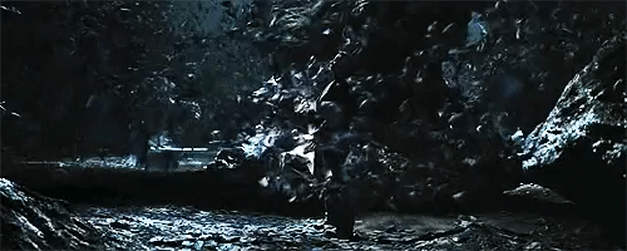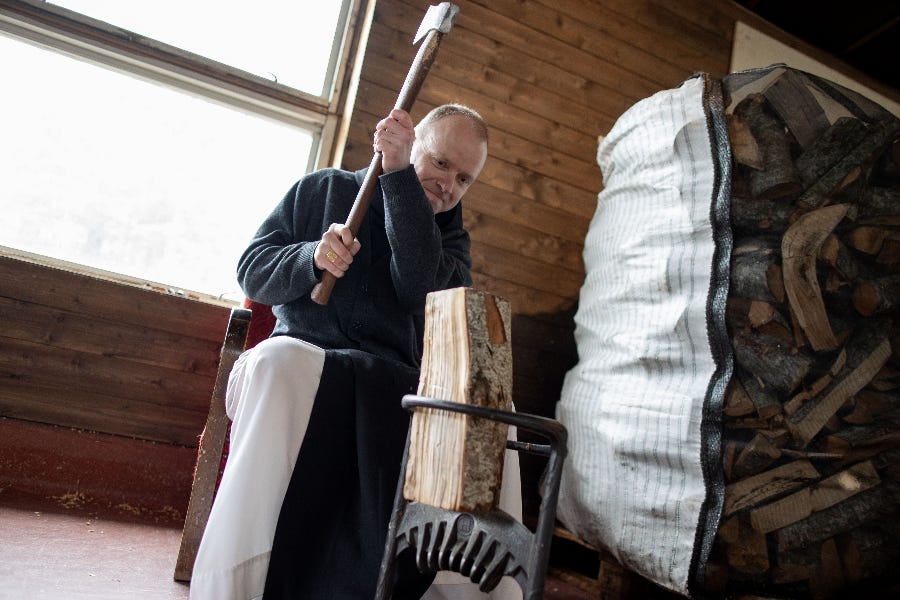Happy Friday friends,
I’ve been attempting vacation this week, hoping to spend a few days up at the lake with my family and without constantly distracting myself with work. The results were mixed.
I ended up spending a good-ish portion of it laid up in bed with some kind of bug, I don’t know exactly which. Whatever it was, it came and went in a 36-hour fever dream that would have qualified as a prophetic religious experience in many parts of the world, for much of human history.
The bug did force my first proper break from my phone I have had in several years, so for that I suppose I should be grateful.
While I’ve been away, I note, it’s been a light-ish week in the news here at The Pillar, which we will get to in a second.
I’d love to wag a finger and imply that, well, without me around, people tend to slack off a little, but I know it isn’t true.
The only ecclesiastical news I allowed myself during my four whole days off was Starting Seven, now that Luke has thankfully come back from his own vacation.
And, thanks to a (very) few messages from JD beginning “I know you’re on vacation but I thought you’d want to know…”, I do know he’s been working on half a dozen stories with his usual unbounded enthusiasm — and he was right, I actually did want to know.
The thing about JD is, and don’t tell him I said this, if no one is there to make him tie a story off and actually file some copy, he’ll keep getting more and more engrossed in it — calling more people, compiling hours of interview tape, mapping out years of background, and knocking out lengthy character sketches of the people he finds most compelling along the way.
It makes for great reporting, as we’ve all seen. But it probably made for slightly fewer stories on the site for a couple of days.
Honestly, if I hadn’t declared myself back at work yesterday afternoon, I think there’s an even chance that by Monday he’d have rented a house and moved to the Pacific Northwest to better understand a diocesan plan for parish restructuring.
But I did declare myself back at work yesterday afternoon — even while JD told me to stay away a few more days. You might use the word “obsessive,” my wife does, or “maniacal,” as JD may have, but I prefer “dedicated.”
We love what we do here at The Pillar, and we do — all of us — have a tendency to obsess a little over the stories we cover. And, honestly, if at least one of us doesn’t think a story is worth obsessing over, at least a little, we don’t tend to cover it.
A few of you did send me kind messages over the weekend expressing your hope that I’d take a proper vacation — one or two of you suggested I “clearly need a break,” whatever that’s supposed to mean.
It was a good break — albeit a sick one — but I’m glad to be back in the office. Truthfully, I feel decidedly more relaxed at my desk, anyway. I love what I get to do here.
So thank you, really thank you, to the handful of you readers who are paying subscribers. You’re the only reason we get to do this.
And if any of the rest of you are genuinely worried about my burning out, there’s a really simple way to help me relax…
Anyway, here’s the news.
The News
Pope Francis is in Mongolia today, beginning the first-ever papal trip to the country.
It is a long way for Francis to travel. Waiting for him there is the relatively tiny community of fewer than 1,500 Catholics, spread across a country the size of Alaska. It’s quite the change of pace from the millions-strong crowds at World Youth Day last month.
So how did Catholicism arrive in the country once regarded by Westerners as unfathomably exotic and remote? How has the Church fared? And why do some observers describe its recent growth as extraordinary?
—
Sexual assault charges against Theodore McCarrick were dropped in Massachusetts Wednesday, after a judge ruled that McCarrick is not mentally competent to stand trial.
The former cardinal, 93, was charged in 2021 with molesting a 16-year-old boy in 1974 at a Massachusetts wedding reception.
But in June, an expert hired by the state of Massachusetts recommended that McCarrick should be judged incompetent to stand trial on the decades-old sexual assault charges.
For a lot of people, not least his victims, it can look and feel a lot like McCarrick is escaping his final reckoning through infirmity and senility, and I’d just note two things about that.
First, he’s not escaping anything — at least not for very long. His advanced years and declining health are bringing Theodore McCarrick closer to, not farther from a full account of his life and crimes. The Four Last Things which we all must face — death, judgment, heaven and hell — are real. And McCarrick will get his day before the ultimate tribunal, as will we all.
But inability to bring him to book in an earthly courtroom should leave us all rightly angry. And it should serve as a reminder to all of us how it came to this.
McCarrick’s crimes only came to light in his twilight years because so many of his peers, and those within his orbit of patronage and influence, were persuaded to look the other way when he was in his prime.
Making sure that never happens again is one of the bedrock reasons we started The Pillar, and that work is still before us.
You can read the whole story here.
—
Cardinal Anders Arborelius is a history-maker: A convert to the Catholic faith and a Carmelite, he is the first Swede since the Reformation to become a bishop and as of 2017 the first Swede ever to become a member of the College of Cardinals.
In a long joint interview this week, together with the Church of Sweden’s Bishop Karin Johannesson, Cardinal Arborelius talked with The Pillar about “receptive ecumenism” and how the Church can be a “prophetic minority” in a country with only a 2% Catholic population.
This is a fascinating interview, and well worth a long read this weekend.
Sweden is anyone’s definition — including the cardinal’s — of a secular culture, one where the Church was banned for centuries and where Catholics faced legal restrictions as recently as the 1950s.
But Arborelius sees it differently. He talks about Sweden as a “post-secular” culture — one in which people, tired of agnostic materialism, are looking for meaning anew.
How the Church orders her life in that culture is a fascinating question, and one well-worth considering, given the demographic trends in many Western countries.
—
Tomorrow, Archbishop Rui Valério will be installed as the new Archbishop of Lisbon. He’ll also get a very cool title — he will be known from then on as Rui I, the 18th Patriarch of Lisbon.
But what exactly is a patriarchate? And why does Lisbon get to be one?
Well, if you have questions, The Pillar has answers. You can read this excellent explainer from our man on the ground, Filipe d’Avillez, to find out all about it.
—
Police have arrested a man in Salem, Oregon on suspicion of arson over the burning of St. Joseph Catholic Church, one of the oldest churches in the region.
—
The last story I discussed last week before I clocked off for a few days was, of course, the funeral of Bishop Howard Hubbard, emeritus of Albany.
JD and I had a long conversation about the bishop on The Pillar Podcast last week — his doctrinal and disciplinary departures from the Church, his legal issues, and the decision of his successor bishop in Albany to preside over a celebratory send off of a funeral last Friday.
I remain of the opinion that it was a misjudgment in the Albany diocese to waive aside, without explanation or apparent interest, the obvious provisions of canon law about giving a Catholic funeral to a bishop whose final public act was to notoriously reject the authority of the Holy See and attempt civil marriage.
But, I learned with ironic amusement this week, I wasn't the only person upset at the tenor of Hubbard’s send off.
More than a dozen of Hubbard’s nieces and nephews went to the press after trying to confront Scharfenberger over what they called his “detestable” homily which, they say, failed to acknowledge that Hubbard “did nothing less than reestablish the moral standing of the local church during his leadership.”
Among his other claims to notoriety, Hubbard, I would just note, admitted to moving known abusers of minors from assignment to assignment around the diocese to avoid a public scandal and, at the time he died, faced multiple accusations of sexual abuse himself, which he denied.
My heart does go out to Bishop Scharfenberger, though. You really can’t please anyone.
This newsletter is brought to you by the Institute of Catholic Culture.
The Institute of Catholic Culture is now enrolling students in The Cardinal Virtues: Keys to the Good Life! This free, ten-part, online course treats prudence, justice, fortitude, and temperance according to the thought of Aristotle, Aquinas, and twentieth-century Thomist philosopher Josef Pieper. Learn more!
I am Batman
I mentioned that I fell ill earlier this week, and I did. The truth is, several of the adults were laid low with the same illness in succession, perhaps even a few of the children too, who knows? When we are all up at the lake people tend to be having too much fun, and things are a little too busy, to take much notice of these things unless you have to.
But the timing of my bout did matter a little, at least to me. I was really only taking three full days off from work, and one of them was earmarked for driving back to Washington. So losing another to feverish delirium was a blow. On the other hand, the secret to being a great uncle is never wasting a good narrative.
Case in point:
The night before I fell ill, while I was still feeling fine, a bat squirted through the momentarily open screen door and into the house.
It would be unseemly for me to list exactly who did what after that, but suffice to say there was a lot of screaming, diving under sofa cushions, and commando crawling to relative safety.
I, on the other hand, took charge of the situation. Someone had to.
Fetching one of the 3x4-inch nets the kids use for catching crayfish, I stood in the center of the living room, an island of calm as the bat wheeled around me.
I don’t want to oversell my ninja-like reflexes but, as I recall events, I closed my eyes with total focus, my hand flashed out no more than three times, and the bat was returned to the outer darkness without further ado.
When I was unable to make it out of be the next day, and only briefly resurfaced the following evening, I led my nieces and nephews to believe the bat had bitten me the night before. My disheveled appearance and feverish aversions to daylight were, I darkly assured them, signs of the vampirism which I was trying to fend off.
Of course, when I emerged Wednesday morning clear-eyed (and a few pounds lighter) they were suitably relieved and impressed. As they should be. Their uncle is a superhero.
See you next week,
Ed. Condon
Editor
The Pillar







